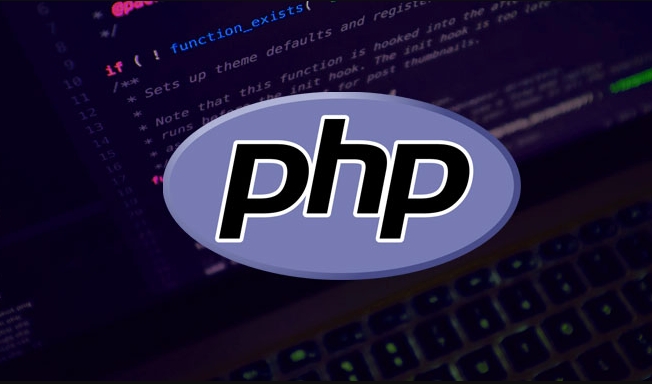In PHP, if you want the function to modify the original array itself, you need to implement it through reference passing. The specific method is to add an & symbol before the parameter name when defining function parameters, so that the internal operations of the function directly affect external variables. For example: function modifyArray(&$arr) { $arr[] = 'new element'; }, after calling modifyArray($myArray), $myArray will be modified. Notes include: 1. There is no need to add &;2. The temporary value cannot be used as a reference parameter; 3. The reference parameters may affect the readability of the code, and it is recommended to add comments. Reference delivery is suitable for scenarios such as modifying large arrays, sharing data structures, or implementing specific design patterns. Although similar effects can also be achieved by returning new arrays, using reference passes is simpler and more efficient.

In PHP, if you want to pass an array to a function and let this function modify the original array itself (not its copy), you need to pass by reference. PHP defaults to passing parameters by value, but you can implement reference passing in some ways.

Basic practice: Use & symbols
The most direct way is to prepend the & name when defining function parameters. This way the parameter will be passed in reference form, and any operation on the variable inside the function will affect the original variable outside.

For example:
function modifyArray(&$arr) {
$arr[] = 'new element';
}
$myArray = [1, 2, 3];
modifyArray($myArray);
print_r($myArray); // The output contains new elements In this example, $myArray is successfully passed into the function as a reference and modified inside the function.

Notes and common misunderstandings
- There is no need to add
&when calling : Starting from PHP 5, reference passing has been specified in the function definition. Do not write&when calling, otherwise it may cause errors or warnings. - Temporary values ??cannot be used as reference parameters : for example,
modifyArray([1,2,3])will report an error because the passed is a temporary array and there are no variables to reference. - Reference parameters will affect readability : if others look at your code, it may not be easy to find that a function will modify the variables passed in. It is recommended to state it in the documentation or comments.
Examples of usage scenarios
Reference passes are commonly used in the following situations:
- Modify the contents of large arrays without copying the entire array
- Share and modify the same data structure between multiple functions
- Implement certain design patterns (such as observer mode)
To give an example of a practical point: you have a function that processes user lists, which will filter, sort or add additional information to the original array. This is appropriate to pass it with references.
Other alternatives (not recommended)
Although similar effects can also be achieved by returning a new array, for example:
function addElement($arr) {
$arr[] = 'new';
return $arr;
}
$myArray = addElement($myArray);However, this method needs to be assigned back every time, especially when frequently modifying the array, it will appear verbose and slightly inefficient (especially when there are large data volumes).
In general, adding & before function parameters is the most concise and effective way. As long as you pay attention to not abuse it, it will basically meet most of the needs.
The above is the detailed content of how to pass a php array to a function by reference. For more information, please follow other related articles on the PHP Chinese website!

Hot AI Tools

Undress AI Tool
Undress images for free

Undresser.AI Undress
AI-powered app for creating realistic nude photos

AI Clothes Remover
Online AI tool for removing clothes from photos.

Clothoff.io
AI clothes remover

Video Face Swap
Swap faces in any video effortlessly with our completely free AI face swap tool!

Hot Article

Hot Tools

Notepad++7.3.1
Easy-to-use and free code editor

SublimeText3 Chinese version
Chinese version, very easy to use

Zend Studio 13.0.1
Powerful PHP integrated development environment

Dreamweaver CS6
Visual web development tools

SublimeText3 Mac version
God-level code editing software (SublimeText3)
 PHP Variable Scope Explained
Jul 17, 2025 am 04:16 AM
PHP Variable Scope Explained
Jul 17, 2025 am 04:16 AM
Common problems and solutions for PHP variable scope include: 1. The global variable cannot be accessed within the function, and it needs to be passed in using the global keyword or parameter; 2. The static variable is declared with static, and it is only initialized once and the value is maintained between multiple calls; 3. Hyperglobal variables such as $_GET and $_POST can be used directly in any scope, but you need to pay attention to safe filtering; 4. Anonymous functions need to introduce parent scope variables through the use keyword, and when modifying external variables, you need to pass a reference. Mastering these rules can help avoid errors and improve code stability.
 How to handle File Uploads securely in PHP?
Jul 08, 2025 am 02:37 AM
How to handle File Uploads securely in PHP?
Jul 08, 2025 am 02:37 AM
To safely handle PHP file uploads, you need to verify the source and type, control the file name and path, set server restrictions, and process media files twice. 1. Verify the upload source to prevent CSRF through token and detect the real MIME type through finfo_file using whitelist control; 2. Rename the file to a random string and determine the extension to store it in a non-Web directory according to the detection type; 3. PHP configuration limits the upload size and temporary directory Nginx/Apache prohibits access to the upload directory; 4. The GD library resaves the pictures to clear potential malicious data.
 Commenting Out Code in PHP
Jul 18, 2025 am 04:57 AM
Commenting Out Code in PHP
Jul 18, 2025 am 04:57 AM
There are three common methods for PHP comment code: 1. Use // or # to block one line of code, and it is recommended to use //; 2. Use /.../ to wrap code blocks with multiple lines, which cannot be nested but can be crossed; 3. Combination skills comments such as using /if(){}/ to control logic blocks, or to improve efficiency with editor shortcut keys, you should pay attention to closing symbols and avoid nesting when using them.
 How Do Generators Work in PHP?
Jul 11, 2025 am 03:12 AM
How Do Generators Work in PHP?
Jul 11, 2025 am 03:12 AM
AgeneratorinPHPisamemory-efficientwaytoiterateoverlargedatasetsbyyieldingvaluesoneatatimeinsteadofreturningthemallatonce.1.Generatorsusetheyieldkeywordtoproducevaluesondemand,reducingmemoryusage.2.Theyareusefulforhandlingbigloops,readinglargefiles,or
 Tips for Writing PHP Comments
Jul 18, 2025 am 04:51 AM
Tips for Writing PHP Comments
Jul 18, 2025 am 04:51 AM
The key to writing PHP comments is to clarify the purpose and specifications. Comments should explain "why" rather than "what was done", avoiding redundancy or too simplicity. 1. Use a unified format, such as docblock (/*/) for class and method descriptions to improve readability and tool compatibility; 2. Emphasize the reasons behind the logic, such as why JS jumps need to be output manually; 3. Add an overview description before complex code, describe the process in steps, and help understand the overall idea; 4. Use TODO and FIXME rationally to mark to-do items and problems to facilitate subsequent tracking and collaboration. Good annotations can reduce communication costs and improve code maintenance efficiency.
 Learning PHP: A Beginner's Guide
Jul 18, 2025 am 04:54 AM
Learning PHP: A Beginner's Guide
Jul 18, 2025 am 04:54 AM
TolearnPHPeffectively,startbysettingupalocalserverenvironmentusingtoolslikeXAMPPandacodeeditorlikeVSCode.1)InstallXAMPPforApache,MySQL,andPHP.2)Useacodeeditorforsyntaxsupport.3)TestyoursetupwithasimplePHPfile.Next,learnPHPbasicsincludingvariables,ech
 How to access a character in a string by index in PHP
Jul 12, 2025 am 03:15 AM
How to access a character in a string by index in PHP
Jul 12, 2025 am 03:15 AM
In PHP, you can use square brackets or curly braces to obtain string specific index characters, but square brackets are recommended; the index starts from 0, and the access outside the range returns a null value and cannot be assigned a value; mb_substr is required to handle multi-byte characters. For example: $str="hello";echo$str[0]; output h; and Chinese characters such as mb_substr($str,1,1) need to obtain the correct result; in actual applications, the length of the string should be checked before looping, dynamic strings need to be verified for validity, and multilingual projects recommend using multi-byte security functions uniformly.
 Quick PHP Installation Tutorial
Jul 18, 2025 am 04:52 AM
Quick PHP Installation Tutorial
Jul 18, 2025 am 04:52 AM
ToinstallPHPquickly,useXAMPPonWindowsorHomebrewonmacOS.1.OnWindows,downloadandinstallXAMPP,selectcomponents,startApache,andplacefilesinhtdocs.2.Alternatively,manuallyinstallPHPfromphp.netandsetupaserverlikeApache.3.OnmacOS,installHomebrew,thenrun'bre






